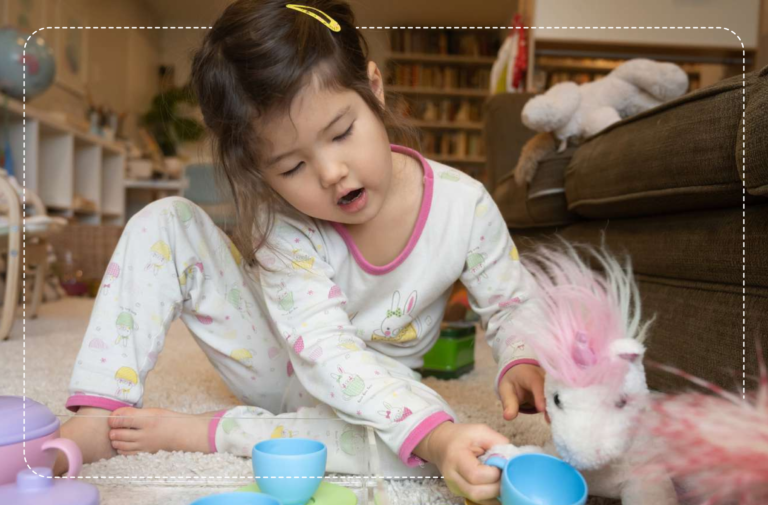Why Do Kids Have Imaginary Friends?

As parents, it’s common to witness our children engaging in fascinating make-believe worlds, complete with imaginary friends. These whimsical companions can spark curiosity and creativity but may also raise questions and concerns. Rest assured, dear parents, having an imaginary friend is a perfectly normal and delightful phase in your child’s development. Let’s explore with Toley this enchanting world and discover why there’s truly nothing to worry about.
The Power of Imagination
Imagination is a wondrous gift that allows children to explore their inner worlds and expand their horizons. Though invisible to us, imaginary friends become very real and significant to your child. They serve as confidants, playmates, and even as sounding boards for their thoughts and emotions. Through their imaginary friends, children learn to express themselves, problem-solve, and develop other essential social skills such as:
- Enhancing Creativity: Imaginary friends fuel your child’s creative spirit, encouraging them to dream up extraordinary scenarios and narratives. These imaginative play sessions provide an outlet for self-expression and allow children to experiment with different roles and situations. By inventing stories and engaging in make-believe adventures, they cultivate their storytelling abilities, which are vital for cognitive and linguistic development.
- Emotional Expression and Empathy: Having an imaginary friend can be a beautiful tool for emotional expression. Children often confide in their imaginary friends, sharing their joys, fears, and worries. This imaginative bond allows them to process complex emotions in a safe and non-judgmental space. Through these interactions, children develop empathy as they navigate the perspectives and feelings of their imaginary companions. This emotional intelligence will positively impact their relationships with others in the future.
- Social Skills Development: Imaginary friends can also serve as valuable companions when it comes to social development. Interacting with their imaginary friend allows children to practice conversations, negotiation, and conflict resolution. They learn to take turns, share, and cooperate, all of which are essential skills for healthy social interactions. While engaging with their imaginary friends, children build the foundations for genuine friendships and develop the ability to navigate social dynamics.
Imaginary Friends: A Temporary Phase?
It’s important to understand that the presence of imaginary friends is a temporary phase in your child’s growth. Their reliance on these invisible companions naturally diminishes as their cognitive abilities and social interactions evolve. Eventually, imaginary friends fade away as your child becomes more engrossed in the tangible world and forms connections with real-life peers.
Supporting Your Child's Imaginary Friend
As parents, our role is to embrace and support our children’s imaginative journeys. Here are a few gentle ways to nurture this enchanting phase:
- Encourage and participate in imaginative play: Embrace the magic of make-believe by joining your child’s creative adventures. Play along with their scenarios, ask open-ended questions, and allow their creativity to flourish.
- Listen attentively: When your child shares stories or conversations involving their imaginary friend, lend a patient and attentive ear. Show genuine interest and curiosity, which will help foster their confidence and emotional expression.
- Respect their imaginative world: Treat your child’s imaginary friend with the same respect you would show a real friend. Avoid dismissing or ridiculing their beliefs, which may discourage their imagination and hinder their emotional development.
- Create opportunities for socialization: While imaginary friends are wonderful companions, it’s essential to encourage social interactions with real-life peers. Arrange playdates, enroll them in group activities, and support their journey in forming meaningful friendships.
Imaginary friends are not to be feared or dismissed; they are integral to your child’s imaginative world. Through their make-believe companions, children enhance their creativity, develop emotional intelligence, and sharpen their social skills. Embrace this magical phase and cherish the incredible world your child is constructing. With your support, their imaginary friends will guide them toward a deeper understanding of themselves and the captivating realm of imagination!


